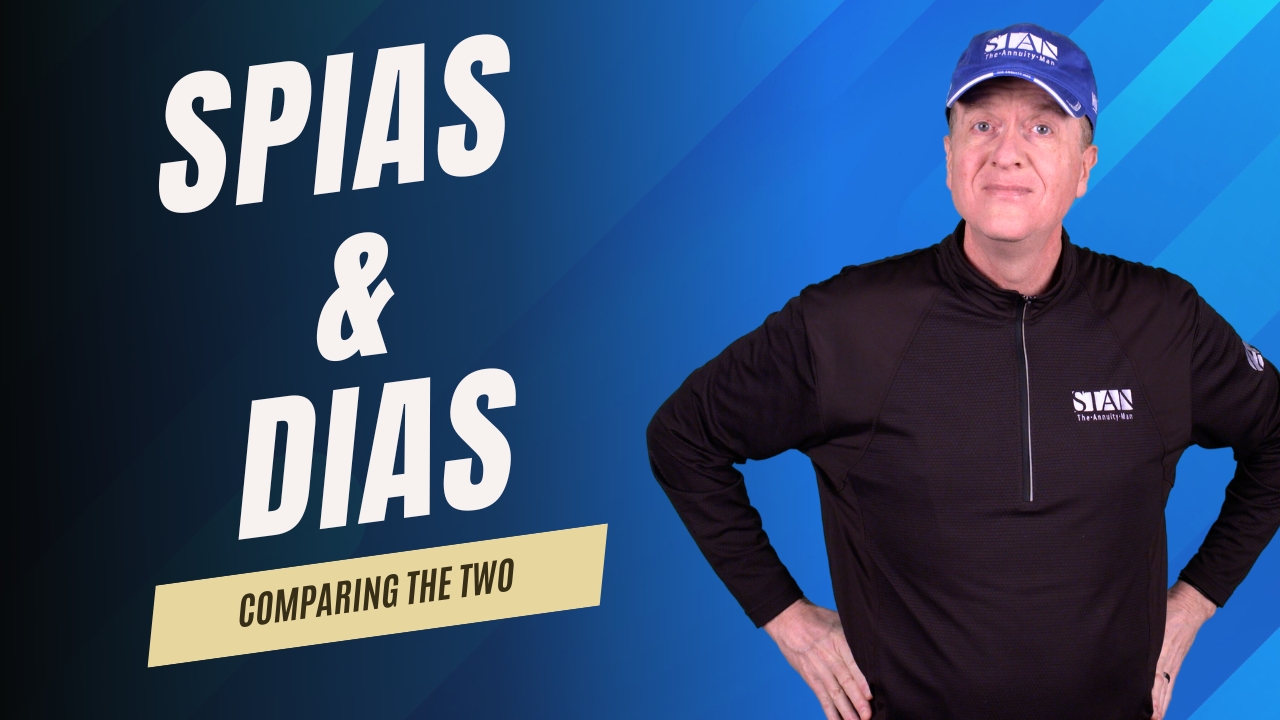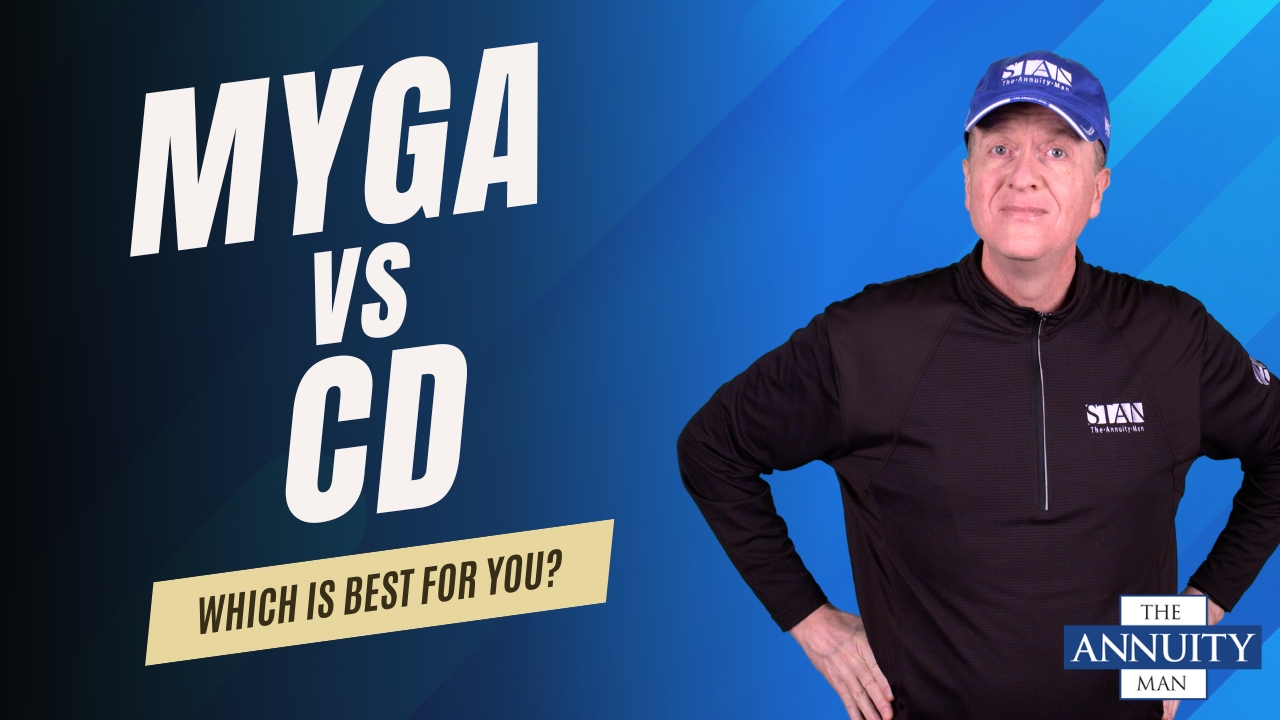Table of Contents
Are Hybrid Annuities Safe?

Hey, Stan The Annuity Man, America's annuity agent, here to help you with the burning question that's on everyone's mind, obviously yours. Are hybrid annuities safe? First of all, the short answer is they are a Fixed Annuity, and they are safe from a principal protection standpoint. But a bigger question is, you didn't come up with the word hybrid. Somebody used that in a sales pitch to you and said the word hybrid, which made you type in hybrid, which made you read this blog.
In my world, hybrid is a plant, like a hybrid plant. Hybrid's a mattress. I know that because I went to a mattress store, and I saw that. And hybrid's a car. If you actually called Stan The Annuity Man and said, "Hey, what's the best hybrid out there?" I would tell you Toyota at this point or Honda. Hybrid is a word that is typically used to sell Fixed Indexed Annuities. I don't know why. I guess it's a sexy word. It means hybrid, it can do all kinds of things. Come on, now. That's what's wrong with the annuity industry; they make up these words out of midair. Hey, buy this hybrid annuity. What? It's an Indexed Annuity.
Now, that's the reason that you need to hang in there with me because I'm going to go over what an Indexed Annuity is. Typically, when they use the word hybrid, when you hear that or you're being pitched that, that's the underlying product behind the word hybrid. So, let's strip that out. Hang in there with me. We're going to get down and dirty about Fixed Indexed Annuities. At the end of this, I'll tell you how to get an Indexed Annuity owner's manual that I wrote, and you can download it for free.
They're Life Insurance Products
Okay, so are hybrid annuities safe? Well, let's rephrase that. Are Fixed Indexed Annuities safe? Well, they are life insurance products. They are not securities. They're regulated at the state level. They're sold across the country like crazy. It's actually one of the most popular annuity products on the planet because there's a lot of sizzle to the sales pitch. The reality of the product is that in 1995, Indexed Annuities were designed and developed to compete with CD returns. And guess what they've done since 1995? Drum roll. CD returns.
Some years are better than others, obviously, but I'm talking blended returns. I know that's not the sales pitch you heard. I know that's not the hybrid sales pitch you heard at the bad chicken or expensive steak dinner seminar that you went to or some ad or mailer that you got that said hybrid.
They said stuff like, "Market upside with no downside." They said stuff like, "Market participation with no loss of principal." Well, they're Fixed Annuities, but they are not market products because they're not FINRA regulated, SEC regulated. They're life insurance products. You need a life insurance license to sell them. That doesn't make them bad. You just have to strip away all the sizzle to get to the steak portion of what a Fixed Indexed Annuity is actually all about.
Multiple Benefits
Fixed Indexed Annuities, aka FIAs, used to be called Equity Indexed Annuities back in the day, but they're not equities, they're not securities. There was this big lawsuit fight, blah, blah. Now, you can't say Equity Indexed Annuities because it's really not. And let's just put the word hybrid beside it because that's what everyone's saying. What does hybrid really mean? Hybrid really means there are multiple benefits, but every single annuity type, QLACs, SPIAs, MYGAs, and Variables are hybrids, and all have multiple benefits.
But because hybrid is used with Indexed Annuities, let's discuss that. So, you're going to get what? You're going to get the accumulated value. Typically, you'll have an income benefit attached. Third, you'll have a confinement care benefit attached. And fourth, you'll have a lock-in of an index option. We're not going to go into the index option nonsense of caps and spreads and all that jazz that you hear because, at the end of the day, hybrid is a CD product.
So, let's go over it. Hybrid, multiple benefits, right? That's really what they're pushing. It's a multiple-benefit product. The accumulation value is on an index option, call option. Great, super. There are five people in the country who can explain it. I'm one of them. I think I know the other four. It's very complicated. It really is. If you bought one from an annuity agent, have them explain it to you. Just try that little exercise. Income benefit, which is the reason that I even look at Indexed Annuities because I think it's a very efficient delivery system for what's called an Income Rider, which is an attached benefit for future income that you can set up your life or joint life, etc. By the way, Indexed Annuities can be put in any type of account: Roth, non-qualified, non-IRA account, or IRA account.
Long-Term Care
And then some of these, and we're talking benefit, benefit, and confinement care. Some agents mistakenly call it long-term care. It's not. But long story short, when you get sicker, you get your money back quicker. So, let's just say your Income Rider is paying you out $5,000 a month when you turn it on. If you pass a couple of, I guess, tests, for lack of a better word, when you get sicker and when your doctors can show that you are sicker based on the parameter set within the indexed annuity contract, they'll take that $5,000, and they'll up it to, say, $10,000. They'll double it. And you say, "Wait a minute, that sounds pretty good." Remember that you're getting your money back quicker. All they're doing is they're saying, "You're sicker." And they're saying, "Your life expectancy is less, so we're going to amp up the income stream so you're getting your money back quicker."
That's okay. It's a benefit. But it's not some pound the table reason to buy. It's just an added guaranteed issue confinement care-type benefit. And then the gains from this index call option lock in annually, or in most cases annually. A lot of the annuity companies out there are getting really fancy, and they'll have a two-year option or a three-year option. But at the end of the day, whatever that gain is locked in permanently. And that's a good thing, too. So, we're talking about hybrids, right? Hybrid's a plant, hybrid's a mattress, hybrid's a car.
It's an Indexed Annuity
And unfortunately, right now, hybrid, and I'm having to explain to people, is an Indexed Annuity. But their agents are using the word hybrid to sell it and sizzle it up. But you need to know what an Indexed Annuity is because they might only use the word Indexed Annuity at the very last second when they have you sign the paperwork. Also, remember this. If it sounds too good to be true with any annuity, it is every single time without exception. Don't believe the hype, as the rapper would say. Buy the steak, not the sizzle.
Client Example
A client called the other day, and he was being pitched by everybody on the planet an Indexed Annuity. I tell people all the time, "If you have a bank account, you're over 50, or you have an IRA over 50, somebody's going to try to sell you an Indexed Annuity. And they're probably going to call it a hybrid." That doesn't mean you have to buy it, but it might make sense if you know the good and the bad and the truth about the product. So, what I told him is, "What do you want the money to do? And when do you want the contractual guarantees to start?" Those are the two questions. Again, what do you want the money to contractually do? And when do you want those contractual guarantees to start?
Well, he said, "Well, the primary thing is I don't want to lose any money." I was like, "I agree." He's at the end of his career, getting ready to retire. Indexed Annuities certainly fit that role, but Multi-Year Guarantee Annuities fit that role as well. We went through the combination of Multi-Year Guarantee Annuities versus an Indexed Annuity, hybrid. And what he decided to do was a combination of the two. Why? The Multi-Year Guarantee Annuity has a guaranteed interest rate, just like a CD. The only guarantee with an Indexed Annuity, hybrid, is that you won't lose any money. The downside is fully protected because it's a Fixed Annuity. Now, you do have potential upside, but it's going to be CD-type returns. But some years, it might be a little bit better than that because that's how they're structured. It was to compete with CD returns and have an enhanced CD-type return.
So, what did he do? He split the money. He bought a five-year MYGA that had a guaranteed interest rate. And he bought a seven-year Indexed Annuity that had that upside within the caps and spreads and all that stuff on the index call option side. He kind of split the baby. And it was a good strategy. He understood that the worst-case scenario with the Indexed Annuity was zero, but he would never lose money. And he understood that the MYGA paid a specific interest rate. So, just food for thought. You can't have your cake and eat it too if it sounds too good to be true. All of those little sayings, put it in the back of your head because I know the Indexed Annuity pitches sound great, but the reality is they're contracts. You have to understand how the contract works in order to be satisfied with the Indexed Annuity purchase.
I do a ton of videos and blogs. In conjunction with what you just read here, watch this video on the truth about Fixed Indexed Annuities. I got a little bit deeper into the product so you can understand it. And I didn't call it a hybrid. I called it what it is, which was an Indexed Annuity. And remember, I've also written a book on that as well. So, you can go to my site and you can get an Indexed Annuity quote. We'll run that for you. We'll show you the best ones out there. You can also download the book here for free. So, do that, make sure you get the books, and feel free to book a call with me. See you next time.
Never forget to live in reality, not the dream, with annuities and contractual guarantees! You can use our calculators, get all six of my books for free, and most importantly book a call with me so we can discuss what works best for your specific situation.
.png)
.svg)















.jpg)
.jpg)

.jpg)
.jpg)
.jpg)
.jpg)
.jpg)
.jpg)
.jpg)

.jpg)

.jpg)

.jpg)
.jpg)
.jpg)
.jpg)
.jpg)
.jpg)
.jpg)
.jpg)
.jpg)
.jpg)

.jpg)
.jpg)

.jpg)
.jpg)
.jpg)
.jpg)
.jpg)
.jpg)
.jpg)
.jpg)
.jpg)
.jpg)
.jpg)
.jpg)
.jpg)















.jpg)
.jpg)
.jpg)
.jpg)
.jpg)
.jpg)
.jpg)
.jpg)
.jpg)
.jpg)
.jpg)
.jpg)


.jpg)

.jpg)
.jpg)

.jpg)
.jpg)

.jpg)

.jpg)





.jpg)
